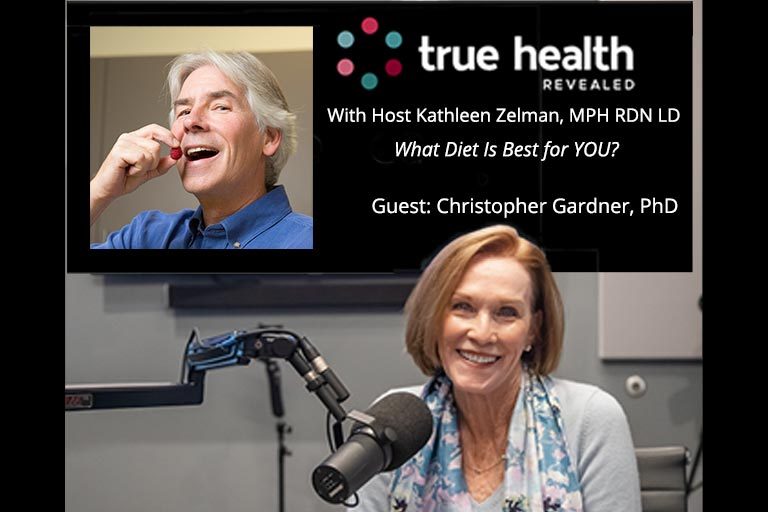
Listen to the Podcast Below:
Season 1, Episode 13 Guest: Dr. Christopher Gardner
We know that nutrition, just like medicine, isn’t one-size-fits-all. Kathleen chats with Stanford’s Dr. Christopher Gardner to better understand the hot topic of personalized nutrition, also called precision nutrition which assumes that each person may have a different response to specific foods and nutrients. Precision nutrition asserts that the best diet for you may look very different than the best diet for another.
But is it premature, does the evidence exist to define individual optimal diets or should we focus on eating according to the Dietary Guidelines? Christopher shares results of many of his research studies that have searched for the best diets.
We also dive into the role of the relationship of diet and the microbiome (gut health). Our diets determine which types of bacteria live in our digestive tracts, and according to precision nutrition the reverse is also true: the types of bacteria we house might determine how we break down certain foods, what types of foods are most beneficial for our bodies and how the microbiome impacts health and wellness.
Key Messages
There are so many variables, including genetics, gut microbes, lifestyle, biological, environmental, and social factors that affect an individual’s precision eating plan to improve overall health.
The best diets start with healthy foods and weight loss can occur on a wide range of diet plans.
One of the downfalls of weight loss diets is cutting calories but when you focus on feeling satisfied, it is much more sustainable long term and results in weight loss.
Fiber rich diets feed the microbiome to produce healthy bacteria in the gut but it also depends on the existing bacteria.
Prebiotics from fermented foods (yogurt, kefir, kombucha, kimchi, sauerkraut..) have the greatest impact on the microbiome that can boost immunity and reduce inflammation
Christopher Gardner, PhD
Christopher Gardner is a nutrition scientist and the Rehnborg Farquhar Professor of Medicine. For 29 years at Stanford he has studied what to consume and to avoid for optimal health, and how best to motivate individuals to achieve healthy dietary behaviors.
Some of the dozens of human nutrition intervention trials he has conducted include studies of garlic, omega-3 fats, soy phytoestrogens and antioxidants. Among his most cited studies are the A TO Z (2007) and the DIETFITS (2018) weight loss diet trials. He has served on various committees of the American Heart Association and the American Diabetes Association, and is currently vice-chair of the AHA Nutrition Committee.
His ongoing trials involve examining the impact of dietary changes (e.g., alternative meat, ketogenic diet) on the gut microbiome and inflammation/immune function. Current research interests include collaborating with chefs and dining operators as research partners in an effort to identify strategies to optimize the intersection of taste, health, environmental sustainability and social justice in institutional food settings (e.g., universities, hospitals, worksites). Professor Gardner teaches several food and nutrition classes at Stanford, including an on-line Nutrition Science course recently launched through the Stanford Center for Health Education.
Off campus he is kept on his toes by four boys, ages 14 to 30, and a marathon-running, political scientist wife who is well known for knitting during meetings. Christopher usually bikes, rarely drives, is an avid volleyball player, and at home he is the head cook. He has almost never been seen wearing at tie.



